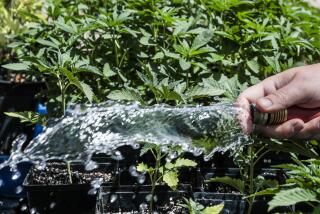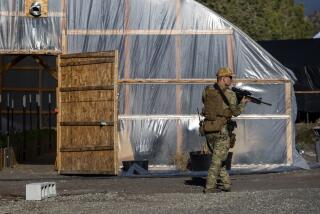Yakama tribe just says no to Washington state’s legal pot market
TOPPENISH, Wash. — The Yakama Nation sits in the fertile heart of illegal marijuana country — Washington state’s answer to Mendocino County, minus the tie-dye.
The soil is rich. The growing season is long. And one of the biggest illegal pot grows in state history was seized here on sacred forested acres where the tribe hunts and gathers food in the shadow of Mt. Adams, also known as Pahto.
A year has passed since Washington voters legalized recreational marijuana use. State officials are poised to issue licenses to grow, process and sell what once was contraband. And the Yakama, after decades of battling substance abuse on their reservation, want no part of what will be one of the first legal recreational pot markets in America.
Which is why George Colby stepped up to the microphone during a raucous autumn meeting of the state Liquor Control Board and issued a stern warning to the officials who are creating the market and the would-be entrepreneurs who want to take part in it.
“I’m here to tell you that if you want to spend half a million dollars on growing marijuana in central Washington, I suggest you don’t do that,” the mild-mannered attorney admonished the crowd on behalf of his 10,000 clients and their 14 million or so acres east of the Cascade Mountains.
“Because we will come after you,” Colby promised. “The Yakama Nation will come after you. And under our treaty, all we have to do is pick up the phone and call the federal government and tell you to get off of our land.”
Local jurisdictions throughout Washington have considered measures to keep recreational marijuana out, at least temporarily, since voters passed Initiative 502 last year — 56% to 44% — legalizing pot and thrusting the Evergreen State into uncharted territory.
But few have arguments as powerful or needs as pressing as the Yakama Nation.
The tribe is ruled by a 158-year-old treaty prohibiting hard alcohol within its boundaries, and it runs one of the few dry casinos in America. Yet the harsh toll of drug and alcohol abuse scars nearly every family on the reservation, from Yakama Chairman Harry Smiskin’s on down.
“We do not want our people, or anyone else, to use, grow or sell marijuana on our lands,” Smiskin wrote in a recent opinion article on the seattlepi.com website. “We have had a long and unpleasant history with marijuana — just as we have had with alcohol. We fight them both on our lands.”
Concern about substance abuse dates from at least the 19th century, when the Yakama signed the Treaty of 1855 under great duress.
Today, the treaty is the tribe’s sole governing document. It protects the Yakama’s interests and is celebrated every summer with two parades, a powwow, a rodeo and a royal court.
Under the agreement, the Yakama reservation consists of just over a million acres; the tribe ceded more than 12 million acres to the federal government but retained the right to fish, hunt and gather traditional foods there.
The entire area is ruled by the treaty, the Yakama Law and Order Code and federal law. The first includes a ban on hard alcohol; no liquor stores exist within the reservation’s boundaries. The other two include bans on marijuana.
Alan E. Rathbun, licensing director for the state Liquor Control Board, said his agency would not issue marijuana business licenses on any federal land, including reservations.
But the Yakama Nation is “a little bit like a checkerboard,” he said, with several incorporated cities within its boundaries. The state has not assigned any of the 334 retail stores it plans to license to those cities — Toppenish, Wapato, and Harrah.
“The issue will be if an applicant chooses to seek a license in those areas” for a store, a grow operation or a processing plant, Rathbun said. “Our guess is the Yakama Nation will object. Then it will be up to the board to make a determination whether they want to issue a license there or not.”
The monthlong application period for marijuana business licenses ended Friday. Applicants have filled out the paperwork for production facilities and processing plants in Toppenish and Wapato. Applications also have been filed for pot operations just outside the border of the Yakama reservation in the tiny towns of Granger, Mabton and Zillah.
The tribe created its own database to monitor applications — not just on the reservation proper but also on the so-called ceded areas — in other words, the entire 14 million acres, more than 30% of the state.
And on Monday, “We’re going to be filing about 200 objections to applications in 10 counties that comprise the ceded and reserved areas of the Yakama Nation,” Colby said. “The citizens of the state of Washington don’t have the right to vote on what happens on tribal land.”
Every summer, Brian Frederickson soars above the reservation in a federal Drug Enforcement Administration helicopter — over forested lands closed to all but the Indians, crop rows as straight as a ruler, the small towns that dot the Yakima Valley floor.
A lieutenant with the Yakama Nation tribal police force, Frederickson is one of the most skilled “spotters” in a multiagency task force aimed at getting rid of illegal pot statewide. Each year the team has been more successful. Each year the job has become more difficult, as growers with ties to Mexican cartels go to greater lengths to hide their efforts.
“This is the different planting style they’re using now,” the burly lieutenant said as his computer screen filled with an aerial photograph showing a thick canopy of pine trees and a few pot plants peeking out beneath them. “In this grow they put a lot of effort into it. All the drip irrigation line was buried. You couldn’t see it from the air.”
Like most voters in and around the reservation, Frederickson said he opposed legalizing a substance he has worked so hard to get rid of.
“Alcohol has such an impact here,” Frederickson said. “I don’t see how anyone can logically think marijuana won’t have an impact. We went from one substance that’s legal. Now we have two to deal with.”
Eleanor Davis had a personal reason to vote against Initiative 502. A tribal elder with a deeply lined face, she spent 20 years at the Youth Treatment Center here, counseling young men and women with substance abuse problems.
Davis, 67, comes from “five or six generations of alcoholism.” She finds it easier to tally the sober members of her extended family than the ones who are still struggling.
Then there are the loved ones she lost, a list that includes the 23-year-old daughter who died of alcohol poisoning and the 21-year-old grandson — her dead daughter’s boy — who got drunk and got behind the wheel of his car after a party.
His Indian name was Kush-a. He has been gone for five years. A small white cross marks the place on the highway where he died.
“After he passed away, that’s when I thought about what my grandmother said,” recounted Davis, who has been sober for 27 years. “You have to go out in the community, and you have to let people know.”
About alcohol. And, now, about marijuana. Because once a joint is as easy to buy as a six-pack, “It’s just going to create more damage to our people,” she said.
“And they just don’t need that.”
maria.laganga@latimes.com
More to Read
Start your day right
Sign up for Essential California for news, features and recommendations from the L.A. Times and beyond in your inbox six days a week.
You may occasionally receive promotional content from the Los Angeles Times.







